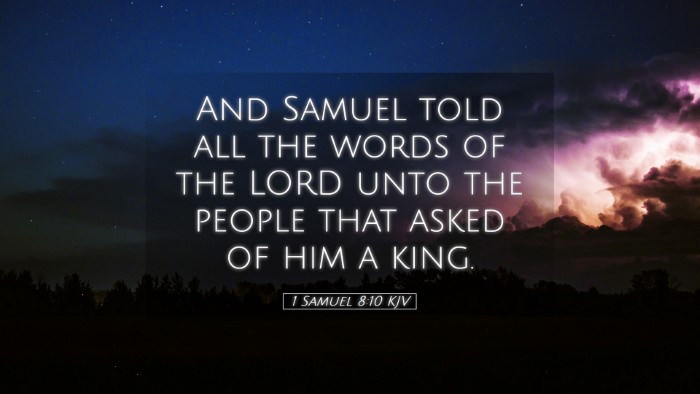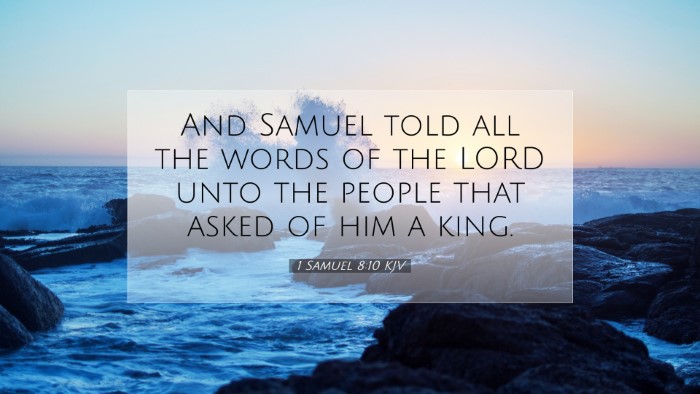Commentary on 1 Samuel 8:10
Verse: "So Samuel told all the words of the Lord unto the people that asked of him a king." (1 Samuel 8:10, KJV)
Introduction
The request for a king by the Israelites marks a pivotal moment in Israel's history and displays a complex interplay of human desire, divine sovereignty, and prophetic communication. In this commentary, we will draw insights from various public domain commentators, including Matthew Henry, Albert Barnes, and Adam Clarke. Each commentator offers a unique perspective that enriches our understanding of the implications of Israel's request for a monarchy.
Context and Background
This verse occurs within a critical narrative: the Israelites, feeling threatened by surrounding nations and discontented with the governance of Samuel and his sons, demand a king. The desire for a monarchy reflects not merely a change in leadership but also a fundamental shift in Israelite identity and reliance on God.
Historical Context
- Leadership of Samuel: Samuel served as a prophet and judge during a tumultuous time in Israel's history. His leadership was marked by a personal relationship with God and a commitment to the people.
- Israel's Desire for a King: The request for a king emerges from a desire to be like other nations, revealing an inherent weakness in their faith and dependence on God.
- Theological Implications: Their request signifies a rejection of divine rule and a human inclination toward external structures of power.
Insights from Commentators
Matthew Henry's Commentary
Matthew Henry emphasizes the weight of Samuel's prophetic role in conveying God's message to the Israelites. He notes:
- Divine Warning: Samuel’s communication of God's words serves as a serious warning to the people about the consequences of choosing a king. Henry suggests that leaders should be attuned to God's guidance and convey it faithfully, emphasizing the dangers of human governance bereft of divine oversight.
- Rejection of God: The request for a king represents a rejection of God Himself as their king, which carries severe spiritual implications. Henry points out that this act signifies a desire for human strength over divine strength.
- God’s Sovereignty: Despite their rebellion, God's sovereignty remains intact. He tells Samuel to heed their request, showing His control over human choices and the unfolding of His divine plan.
Albert Barnes' Commentary
Albert Barnes provides a detailed examination of the implications of the Israelites' request for a king, noting:
- Human Inclination: Barnes highlights the natural human inclination toward visible leadership and organization. He argues that the desire for a king is rooted in the Israelites' lack of trust in God's providence and a longing for external security.
- Prophetic Obedience: Samuel's role as a prophet emphasizes the importance of obedience to God's word. Barnes posits that true leadership in Israel should reflect a commitment to divine governance rather than the establishment of a human institution.
- Consequences of Kingship: The passage foreshadows the burdens that monarchy will impose on Israel. Through Samuel, God reveals that having a king will result in servitude and loss of freedoms, providing a direct warning about the consequences of their decision.
Adam Clarke's Commentary
Adam Clarke offers insights into the sociopolitical dimensions of the Israelites’ request, noting:
- Cultural Pressure: Clarke writes about the societal pressures influencing Israel's demand for a king, comparing their desires to those of neighboring nations. This context illustrates the allure of conformity and the spiritual dangers it poses.
- God's Plan: Clarke suggests that God allowed the Israelites to pursue this path to teach them lessons about governance and leadership. Their desire for a human king is juxtaposed against God’s ultimate plan for His people, reinforcing the theme of divine sovereignty over human intentions.
- Role of the Prophet: The verse highlights the significant role of the prophet in guiding God's people. Clarke emphasizes that true prophets must be committed to relaying God's warnings, even when the messages are unpopular or unwelcome.
Theological Reflections
The implications of 1 Samuel 8:10 extend beyond the historical context in which they were penned. Various theological themes emerge that are vital for contemporary application:
- The Nature of Leadership: True leadership within the church and society must be rooted in God's word. The tension between human authority and divine authority persists, calling believers to evaluate where their ultimate trust lies.
- Consequences of Rebellion: The desire to govern ourselves apart from God leads to consequences that may seem attractive initially but produce spiritual and relational turmoil.
- God's Sovereign Wisdom: Even when humanity strays from His path, God’s purposes remain intact. This verse reminds us that divine sovereignty works through human decisions, often in ways we cannot foresee.
Conclusion
1 Samuel 8:10 serves as a critical turning point in Israel's narrative, where the desire for a king reflects deeper spiritual struggles. Through the insights provided by various commentators, we uncover the themes of prophetic authority, divine warning, and the consequences of rejecting God's rule. Pastors, students, theologians, and scholars are encouraged to meditate on this passage, recognizing its enduring relevance and the call to honor God's design for leadership, both in the church and in personal life.


